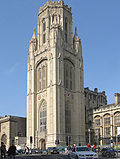University of Bristol
The university denied any discrimination in the admissions process but reserved the right to take the educational background of students into account when assessing their A-level grades. [27] In a written response to the Independent Schools Council, Vice-Chancellor Eric Thomas stated that the university did not operate a quota system for students from any particular school or social background:
The university does not practice unfair discrimination, it [Bristol] does not operate quotas and it will continue to recruit exceptionally able students from all backgrounds through a selection process that is as fair and straightforward as we can make it. Pupils, not schools, make the decisions about which universities to apply to and we are confident that they will continue to want to study at Bristol. [28]
The university highlighted the fact that it is one of the most popular in the country with over 39,000 students for 3,000 places in 2002. [27] In History, English, Economics and Law competition is so fierce that over 30 students can be competing for one place. [28] In English there were 47 places and 1500 applicants of whom 500 had a perfect A-level score of AAA at A2, meaning that many top candidates were rejected. [29]
Eric Thomas also emphasised the work the university was doing to "reach out" beyond the middle-classes. In a BBC interview he stated:
a huge raft of initiatives have been implemented. Things like summer schools in which we bring students to the university during the summer to see it, we have relationships with local schools and further education colleges. [16]
The University of Bristol stated that it is against any kind of discrimination in the admissions process [30] and that the policy of making lower offers to exceptional students from state schools and disadvantaged backgrounds was not to satisfy the government or gain funding:
There is no question of the University attempting to widen participation in order to gain Government cash. Bristol agreed its widening participation strategy in 1998 - long before widening participation became part of Government policy. Work in this field is resource-intensive and funding from the Government helps to cover the costs. The University is not motivated by money but by the desire to recruit the best students and by the recognition that if it is to act fairly and avoid missing out on some of the most able people, it must have regard to factors in addition to predicted A-level grades. [28]
Newspapers reported that the admissions controversy created tensions between state and private school pupils at the university. Gus Glover a candidate who lost that year's University of Bristol Union presidential election attributed his loss to supporting the admissions policy. [31] However, residents of Wills Hall wrote letters to the newspaper defending the hall against accusations of classism. [32]
Politicians
Prime Minister Tony Blair commented on the controversy, stating that university should grant places on the basis of merit rather than class. [35] He added that he wanted to see more working-class people in higher education [36] but was forced to backtrack from comments made by Margaret Hodge which argued that Universities such as Bristol should be set formal targets for widening access. [36]
Charles Clarke, then the Education Secretary, described independent school criticisms as "ill-informed brouhaha". [37] He also stated that it would be inappropriate for government to become too involved in university admissions. [38] The then Shadow Education Secretary Damian Green accused the government of trying to "fiddle admissions for political ends". [39] Liberal Democrat MP Phil Willis said that "social engineering is coming ahead of merit and the development of talent." [36]
Sir Howard Newby chief-executive of the Higher Education Funding Council for England (HEFCE), the university funding body argued that Bristol's admissions policies were fair and accused sections of the media of becoming involved in a "moral panic" over positive discrimination. [40]

